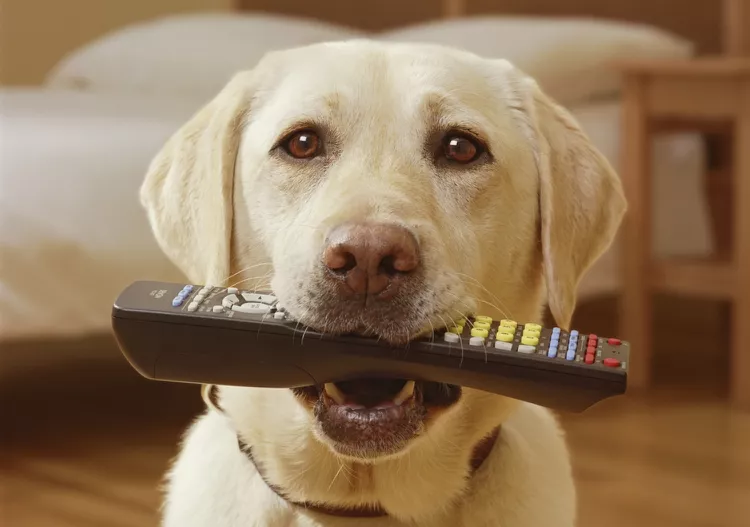What to Do if Your Dog Ate a Battery

Modern technology has given us many gadgets, and with them come batteries. While you may not immediately think of batteries in any way but helpful, they can be a problem when within reach of your curious dog. If your pup were to chew up your remote control and break open or even ingest a battery, you should seek immediate veterinary medical attention.
My Dog Ate a Battery! Now What?
Once you are aware of what has happened, take your pup to your regular vet or a 24 hour emergency veterinary hospital. Before you head out, though, call the ASPCA Animal Poison Control at 1 (888) 426-4435. The specialists at this hotline will ask you what kind of battery, specifically, was ingested and when. There is a usually a consultation charge for using the hotline, but please don't let this deter you from calling.
Just with human medicine, there are simply too many toxins and poisons out there for even the most seasoned ER vet to keep track of. The vets that work at Animal Poison Control truly are the most knowledgeable about such an emergency. During the call, you will be given a case number. Write this down and give it to your vet upon arrival to the hospital. Your vet can then call Animal Poison Control and have the veterinarian on the other end look up your pup's case and give specific instructions for how to treat them based on the history you gave when you called on the way to the vet and based on how your dog appears when you arrive at the vet. Generally speaking, though, treatment will include a radiograph to determine where in the GI tract the battery is and then removal of it. If the battery is still in the stomach or esophagus, removal may be accomplished with endoscopy. However, if on your dog's X-ray it appears the battery has moved to the intestinal area, surgery is the only way to remove the battery.
Your dog will also be given an anti-ulcer medication and/or a GI protectant. Your vet may also want your dog to be on a bland or high-fiber diet for the next few days while they recover from their ordeal.
What's in a Battery Anyway?
The most common household batteries that are ingested by dogs are either button/disc batteries or alkaline dry cell batteries (D, C, AA, AAA, and 9V). These batteries contain either potassium hydroxide or sodium hydroxide, and when either of these compounds come into contact with skin, it can cause a form of tissue damage called tissue necrosis. Additionally, those newer disc-shaped batteries can allow for an electrical current to pass to and through the tissues of your dog's GI system as the battery passes through the tract, resulting in the possibility for tissue damage anywhere along the GI tract. Although less common in homes, lithium batteries are especially dangerous because they are the most corrosive. After just 15 minutes of contact time, a small 3 V lithium battery can begin to cause tissue necrosis.
Symptoms of burns from the corrosive hydroxides can include redness and rawness to the tips or sides of the tongue or lips. You may also note a whitish-gray discoloration to these same areas from dead skin cells. The irritation from the battery may also cause your dog to hypersalivate (excessive drooling) and may have difficulty swallowing or chewing.
Warning
Your dog may vomit, but under no circumstances should you induce vomiting in your dog. This may cause even more irritation to your dog's esophagus and mouth.
Corrosive compounds and currents aren't the only hazard batteries contain, though. Some batteries may also contain heavy metals. Heavy metal toxicity can occur if these types of batteries are ingested, although it a more rare complication of battery ingestion. This is because the battery must be in the GI tract for at least 2-3 days for signs of heavy metal toxicity to begin to emerge.
How to Prevent Your Dog From Eating a Battery
Even though your dog can be treated for eating a battery, surgery is a fairly invasive treatment. As with a lot of things in the care of your dog, prevention is the best way to keep your pup safe. Remotes, toys, and appliances that require batteries should be kept out of reach. If your dog does have battery-operated, interactive toys, only allow your dog access to them when you are able to supervise their play.
Unfortunately, remotes, toys, and appliances aren't the only things hiding dangerous batteries. Disc batteries especially are everywhere in the modern home—think alarms, car key fobs, digital watches, cameras, even musical greeting cards. If it moves, lights up, or makes sound and doesn't need to be plugged in to an outlet, it's got a battery! So be sure to keep these items our of your dog's reach, too. Batteries are everywhere in our lives, but that doesn't mean we should be complacent about their prevalence. They can pose a major health risk and should always be kept out of reach of your dog.